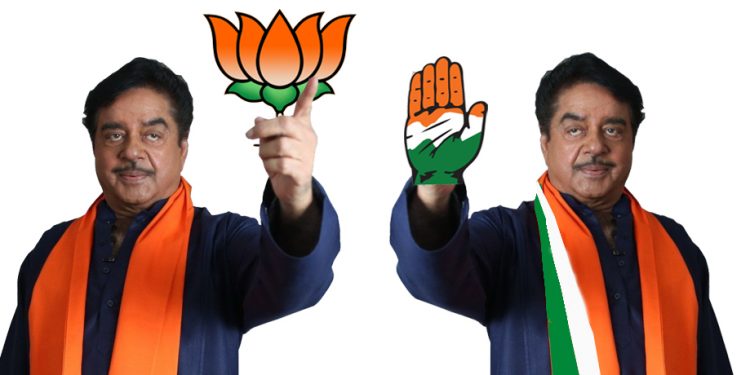The term Aaya Ram, Gaya Ram was most probably born in Haryana in the 1980s. It is said that Bhajan Lall, the then Chief Minister of that State had defected en masse with his whole flock of MLAs from the Janata Party and joined the Congress Party. Now with elections round the corner, it turns out, is once again time for Aaya Rams and Gaya Rams to run amok. Those who have aspired for a ticket but are denied that glorious sheet of paper either as a debutant or for a repeated attempt are naturally heartbroken and more so for a seat in India’s top legislative and representative body named as Parliament. Shotgun Shatrughan Sinha, a Bihar strongman, leads the exit game with an announcement that he would be joining the BJP’s principal rival, the Congress party, soon. It was with considerable interest that the Congress party welcomed him into its ranks.
The grand old party, the Congress, itself faced an embarrassment a few days ago when an AICC functionary for many years and a close associate of Sonia Gandhi quit the party in a huff and found himself being garlanded and welcomed by BJP chief Amit Shah into the saffron party. Tom Vadakkan as a Congress spokesperson was trashing the saffron enterprise day in and day out, and with added frenzy because of his direct links with Sonia Gandhi. He expected a ticket for the past two Lok Sabha polls from native Kerala but was denied. This time, with Rahul Gandhi at the helm, he was probably feeling a sense of alienation. In the end, Vadakkan might not have seen any chance of getting a ticket this time too. The BJP welcomed him, reaped a publicity windfall and managed to slight the Congress but also did not give him any ticket. Now, chances are that he might be ‘used’ for other purposes. This is a ridiculous situation where many, presumably astute, politicians land up on their own accord.
Actress Jaya Prada, who changes party as seasons change, finally found sanctuary in the BJP after a controversial run with the Samajwadi Party. She joined the SP after quitting the Telugu Desam party that she had joined in the 1990s. Such footloose shifts are happening also with other regional parties and in Odisha too, as is well-publicised, turncoats abound. In neighbouring West Bengal, chief minister Mamata Banerjee might have been caught somewhat off guard by the sudden resignation of some senior functionaries in the run-up to the polls. Aaya Rams and Gaya Rams are, as a wider community of uncouth and unprincipled self-seekers, a shameless lot. They deserve to be treated with contempt and shown their place. These occurrences are democracy’s ugly side and the people alone have the power to disincentivise such characters.
Politics in past decades were guided by some sort of ideological concerns. Ideology increasingly started losing its shine because political parties failed to uphold the thoughts they professed. Some ideologies proved to be outdated. For instance, communism in its purest form is difficult to implement in today’s globalised business world. Interestingly, while the West, which fostered Globalization, has started rethinking about its ill effects, countries like India are turning into puppet states at a rapid pace. When the Union of Soviet Socialist Republics (USSR) collapsed under the weight of its own contradictions in the 1980s, China empowered itself in terms of fast-paced economic growth and adopting aspects of capitalist systems. India’s slow growth is lately attributed to its lethargic manpower and lack of drive among its citizens more than adherence to socialism. Blaming Nehru for wrong policies might be easy but unless and until the populace craves to invent and put in hard work, changes of great proportions can never take place. These political Aaya Rams and Gaya Rams are amazing examples of individuals wanting to harvest gold without planting a blade of grass.
This scenario of a wanton disengagement from ideology has its flip side. Now, politics is a circus without a ring. This could be a major reason why Aaya Rams and Gaya Rams have no compunction in deserting one party and instantly changing colour to reach up to the rival political formation. Today’s leaders, too. opt for a person based machinery that they wish would not function without them. This mindset leaves policy and ideology far behind. Without political commitment, these leaders themselves become reviled beings when they are no more in seats of power.
In a democracy, if these unprincipled politicians are to be taken to task it is only the system’s centrepiece, namely the people themselves, who can do it. Admittedly, one’s trust in a particular political party cannot be constant. Nowadays parties themselves change their colours with the change of leaders at the helm.







































